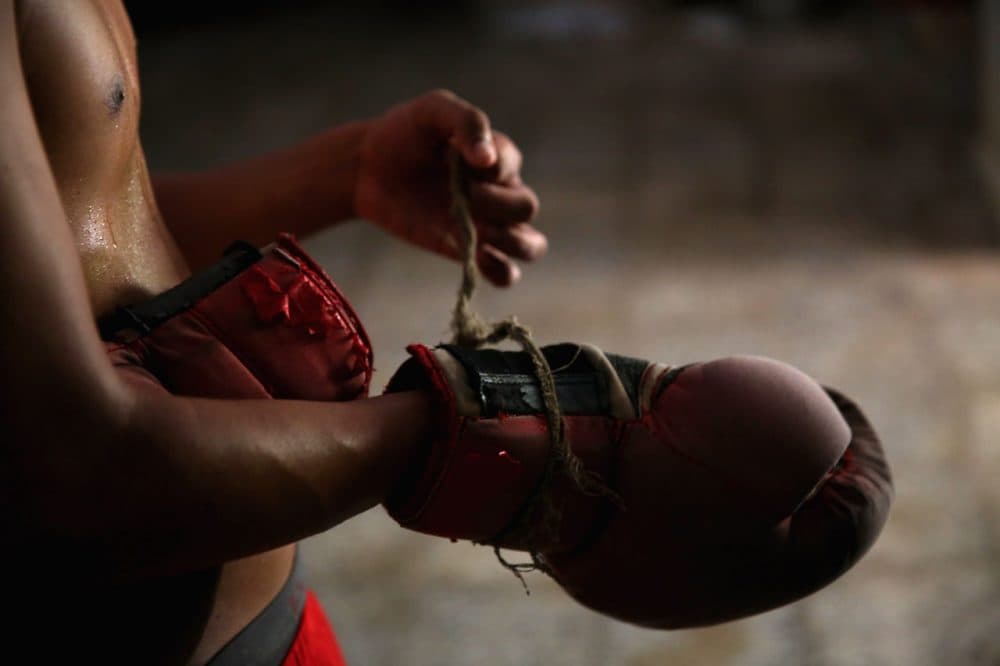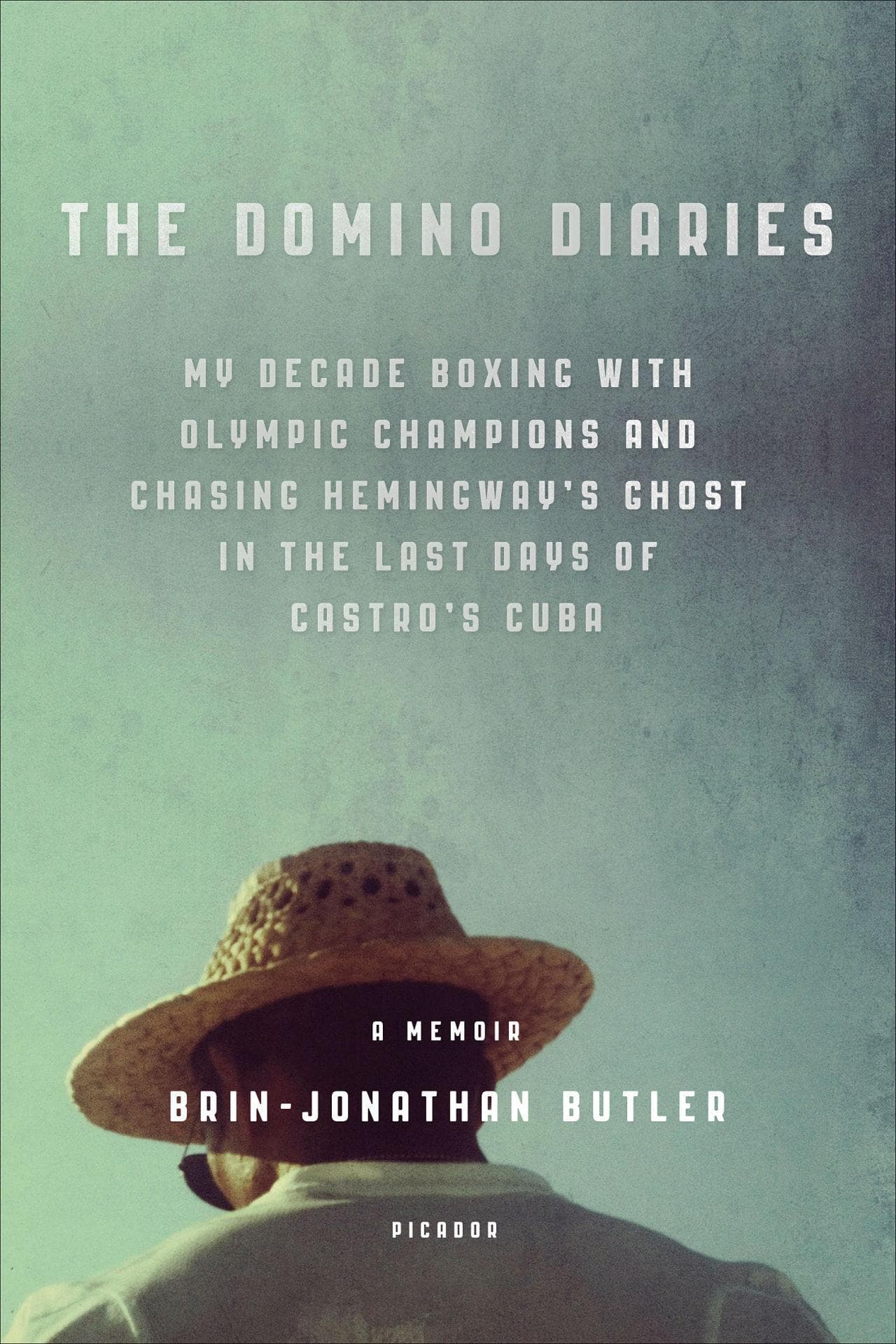Advertisement
'The Domino Diaries' Examines Castro's Cuba Through Its Athletes
Resume
In "The Domino Diaries: My Decade Boxing with Olympic Champions and Chasing Hemingway's Ghost in the Last Days of Castro's Cuba," Brin-Jonathan Butler uses the stories of several Cuban athletes — most of them boxers — to present his own relationship with the complicated circumstances of Cuba.
Butler joined Bill Littlefield.
Highlights From Bill's Conversation With Brin-Jonathan Butler
BL: You originally went to Cuba, as you put it, “to find a boxing trainer and to meet the guy from 'The Old Man and the Sea.'” The trainer in question was Olympic boxer Hector Vinent and, of course, the man was the man Hemingway based his famous novel upon. And, remarkably, you went two-for-two, right?
 BJB: This is true, yeah. So, I literally bumped into Hector Vinent in Havana and worked out a deal for him to train me for $6 a day, which just kind of defies imagination, to have somebody that exquisite at what they do for such an affordable amount of money. Such is life under communism, unfortunately. And with "The Old Man and the Sea," Gregorio Fuentes, I found out that, at 103 years old, he was still living in the same town of Cojima. So, $15 and a bottle of rum and a cigar, because he still smoked at that time, he talked to me about his relationship to Hemingway. So from the outset, Cuba was just extraordinary in how welcoming it was.
BJB: This is true, yeah. So, I literally bumped into Hector Vinent in Havana and worked out a deal for him to train me for $6 a day, which just kind of defies imagination, to have somebody that exquisite at what they do for such an affordable amount of money. Such is life under communism, unfortunately. And with "The Old Man and the Sea," Gregorio Fuentes, I found out that, at 103 years old, he was still living in the same town of Cojima. So, $15 and a bottle of rum and a cigar, because he still smoked at that time, he talked to me about his relationship to Hemingway. So from the outset, Cuba was just extraordinary in how welcoming it was.BL: The distinction between boxers Hector Vinent and Teófilo Stevenson — national heroes in Cuba — and those who left the island, like pitcher Orlando “El Duque” Hernandez and boxer Guillermo Rigondeaux, is dramatic. Given recent developments in relations between the U.S. and Cuba, will there still be such a distinction in the future?
BJB: Ah, no, I think it is evolving. Ninety-eight percent of all the athletes since Castro came to power stayed and now you have this vastly lucrative human-smuggling operation. It's just a nightmare for the government, and they need to come up with some kind of compromise. So I think that the middle ground will be allowing these guys to be farmed out the way that they've done with coaches. They've allowed coaches to train internationally, but I think very quickly what we're seeing in Cuba right now is very much a two-tier system of have and have-nots, and I don't know how tenable that is. And I think it's only going to get worse as more and more tourism succeeds where the Bay of Pigs fails in changing that society.
BL: When you talk about people that you run into on this journey, you really surprised me with one of them — who would've guessed you'd have an affair with Fidel Castro's granddaughter.
BJB: Yeah, I didn't see that one coming, either. As they say, it's the biggest small town in the world. You never know who you're going to bump into, and it just turned out a beautiful girl at a New Year's party happened to have some pretty famous bloodline.
BL: And as far as kissing and telling, that's, I'm sure, all you're going to want to say?
BL: Did you finally come away from this project with an understanding of why so many great boxers and other athletes have elected to remain in Cuba? Did you feel you understood that in your heart, as well as intellectually.
BJB: Well I think it goes back to when Columbus first arrived in Cuba, just before he wiped everybody out there through genocide, slavery and starvation and suicide. He asked them, "Hey, is this an island?" And one of the natives, the Taínos, said, "Yeah, it is an island, but it's infinite." And I think, 11 years later, I understand a lot less about Cuba than when I started. That's sort of what I wanted to offer with the book, was just to capture some of that the best that I could.
Bill’s Thoughts On ‘The Domino Diaries’
With "The Domino Diaries," Brin-Jonathan Butler provides a sense of the complexity of contemporary Cuba.
This is a significant achievement.
[sidebar title="An Excerpt From 'The Domino Diaries'" align="right"]Read an excerpt from "The Domino Diaries" by Brin-Jonatahn Butler.[/sidebar]According to Butler, Cuba is not simply a utopia of free medical care and total literacy. The medical care is accessible, and the literacy rate is exceptionally high. But lots of the doctors moonlight as cab drivers, because they can’t make a living practicing medicine.
Supporters of what Fidel Castro has wrought in Cuba point to the fact that whereas homelessness is epidemic in the U.S., nobody in Cuba is homeless. They have a point, but a lot of the homes in which Cubans live are falling apart. So are lots of the things in the homes, and the wait to get a refrigerator fixed can run to months.
No matter. Butler loves much about Cuba, and that love is evident in his writing, whether the subject is a former Olympic champion suffering from alcoholism or one of the beautiful Cuban women after whom Butler, now no longer welcome on the island, still yearns.
Boxers, baseball players, and various other athletes and former athletes figure prominently in "The Domino Diaries," which is why I got to call reading it and speaking with the author “work.” It didn’t feel like work. "The Domino Diaries" isn’t “a sports book;” it’s a thoughtful and ambitious account of one fine writer’s experience as he came to know a fascinating place.
This segment aired on October 17, 2015.
